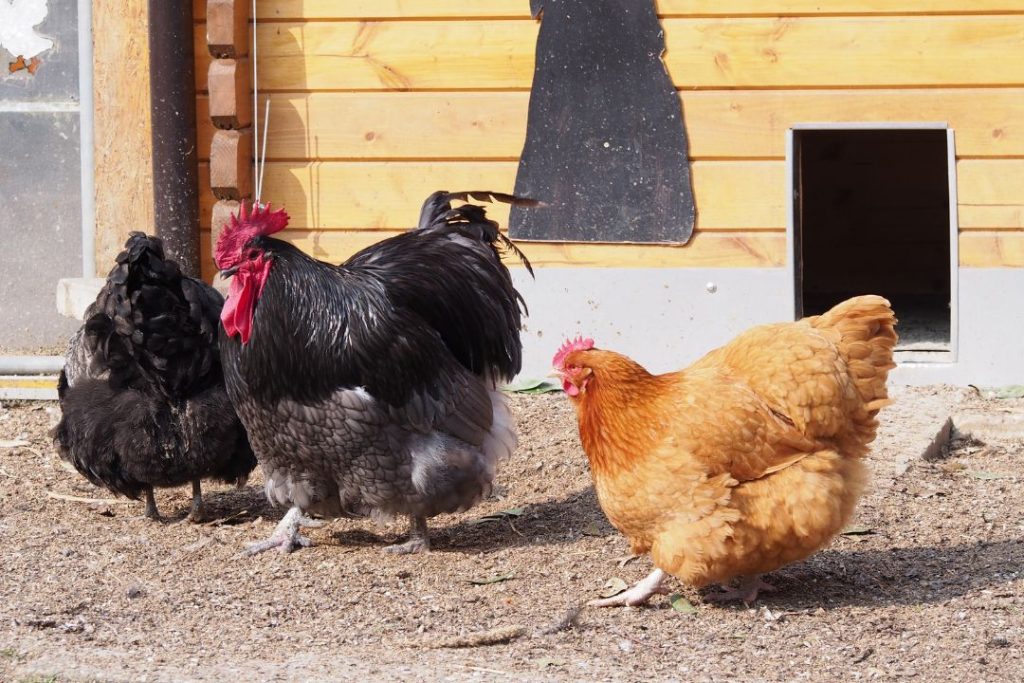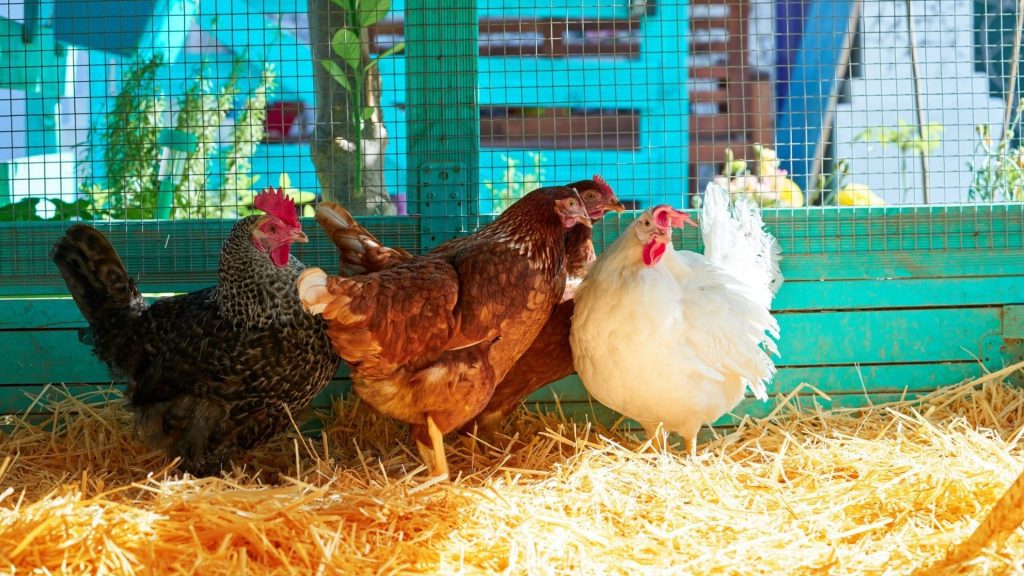Many poultry owners ask a quirky question: “How many times a day does a chicken poop?” But this question reveals much about your chicken’s fascinating world and digestive systems.
Usually, 12 to 15 times a day, your chicken can poop. Actually, how frequently your chicken will poop depends on different factors. Those are your chicken’s age, diet, and health etc.
Younger chickens might poop more frequently. A balanced diet ensures regularity. Health issues can disrupt your chicken’s pooping pattern.
Let’s dive into the details in this article to learn more about your chicken pooping.
How Many Times A Day Does A Chicken Poop?
Chickens are fascinating creatures. Their digestive system is a marvel of nature. You might wonder how many times a day a chicken poops. The answer lies in understanding their unique digestive process.
A chicken’s digestive journey begins with the beak. Pecking at food, they gather grains, insects, and more. The crop, a storage organ, holds the food. Softening occurs here, preparing for the next stage.
The gizzard is a powerful organ. Inside, food is ground into a paste. Tiny stones aid in this grinding. Muscles contract, breaking down the food further.
Next comes the intestines. Nutrients are absorbed here. Waste products are separated and prepared for expulsion. The chicken’s body takes what it needs.
The cloaca is the final stop. Both urine and feces exit through this opening. Chickens are efficient in this way. Their waste elimination is a streamlined process.
So, how many times a day does a chicken poop? On average, 12 to 15 times. Factors like age, diet, and health play a role. Younger chickens might poop more frequently.
What Affects Your Chicken’s pooping?
- Weather affects a chicken’s digestion. Hot weather might reduce their appetite. Cold weather could increase their food intake. Proper shelter and clean water are essential.
- Different chicken breeds have varying needs. Some might require specific diets. Others could be more resilient to changes. Understanding these differences helps in their care.
- Water is vital for chickens. Constant access to clean water promotes healthy digestion. Dehydration can lead to serious problems. Proper hydration ensures smooth digestion.
- Supplements and treats can enhance a chicken’s diet. Calcium is often added for bone health. Treats like fruits provide variety. Moderation with these additions is key.
- Seasonal changes also affect digestion. Winter’s cold requires more energy. Summer’s heat might reduce food intake. Being aware of these changes aids in proper care.
- Human interaction has an impact too. Stress from rough handling can disrupt digestion. Gentle, positive interaction benefits overall health. Happy chickens are healthy chickens.
- Clean coops are another factor. Regular cleaning prevents disease. Proper space allows for comfort. Comfortable chickens are more likely to thrive.
- Egg-laying is another consideration. Nutritional needs change during this time. Proper care and understanding support healthy laying. Happy chickens lay delicious eggs.
What Is Your Chicken’s Digestive Tract?
Chickens are equipped with a digestive system that’s both unique and efficient. Let’s explore each part of this system in detail:
1. Beak and Crop
Chickens begin their digestive journey with their beaks. Pecking at food, they gather what they need. Grains, insects, and greens are favorites.
The food then moves to the crop. This special pouch stores the food. Softening occurs here, with some help from saliva. The crop’s muscles relax and contract. This action helps break down the food. It’s the first step in a complex process.
2. Gizzard
Next, your chicken’s food moves to the gizzard. This organ is a marvel of nature. Muscular and strong, it grinds the food. Tiny stones inside assist in this task.
Chickens swallow these stones for this purpose. The food becomes a paste-like substance. It’s now ready for nutrient absorption. The gizzard grinding action is essential. It ensures that nutrients are accessible.
3. Intestines
The intestines are where absorption happens. Nutrients enter the bloodstream here. The chicken’s body takes what it needs. Proteins, fats, and vitamins are absorbed.
The intestines are long and winding. This shape increases absorption efficiency. Waste products are separated and moved on. The intestines’ role is vital. They ensure that the body is nourished.
4. Cloaca
The cloaca is the final stop. Both urine and feces exit here. Chickens are unique in this way. One opening serves multiple purposes. Waste is expelled efficiently.
The cloaca’s muscles control this process. Urine and feces are often mixed. This mixture is what we recognize as poop. The cloaca’s role is both vital and efficient. It completes the digestive journey.
Understanding your chicken’s digestive tract is fascinating. From the beak to the cloaca, each part plays a role. The process is a marvel of nature. Chickens are well-adapted to their varied diet. Their digestive system reflects this adaptability.
Proper care and feeding support this process. A healthy digestive system means healthy, happy chickens. Their unique ability to process various foods is a testament to their complexity and resilience.
On What Factors Does Your Chicken’s Pooping Frequency Depend?
Your chicken poop anywhere from 12 to 15 times a day. This frequency differs depending on factors like diet, age, and health. Now let’s explore these factors in detail.
1. Diet
Chickens are omnivores. It implies that they eat both plant and animal matter. Their diet includes:
- Grains
- Insects
- Fruits and vegetables
- Commercial chicken feed
What a chicken eats plays a significant role in how often it poops. A diet rich in grains, insects, and greens promotes regular digestion. Commercial feeds designed for chickens often contain a balanced mix of nutrients.
These nutrients are processed and expelled as waste at a consistent rate. Conversely, an unbalanced diet might lead to irregular pooping. Monitoring what your chicken eats can provide insights into its digestive health.
The type and quality of food can significantly impact how often a chicken poops. A balanced diet ensures regular and healthy digestion.
2. Age
Age is another factor that affects how often a chicken poops. Younger chickens, with their rapidly growing bodies, might poop more frequently. Their digestive systems are developing, and they require more nutrients.
As chickens age, their digestive systems become more efficient. The frequency of pooping might stabilize or decrease slightly. Understanding the age-related changes in your chicken’s digestive system can help provide proper care.
3. Health
Healthy chicken poop is firm and brown. Your chicken’s health affect:
- Consistency
- Color
- Frequency
A chicken’s overall health is directly linked to its digestive system. Healthy chickens will poop at a regular and consistent rate. Regularly monitoring your chicken’s pooping habits can be an early warning sign of health problems.
4. Environmental Factors
The environment in which a chicken lives can also influence how often it poops. Access to clean water, proper shelter, and a stress-free environment promote healthy digestion.
Seasonal changes, such as extreme heat or cold, might temporarily affect the frequency of pooping. Providing a comfortable living environment ensures that the digestive system functions optimally.
Warning Signs
Irregular pooping or changes in consistency and color can be signs of health issues. Consult a veterinarian if you notice:
- Diarrhea
- Constipation
- Unusual colors
Frequently Asked Questions
Does the Breed of the Chicken Affect How Many Times A Day It Poops?
While the average frequency of pooping is 12 to 15 times a day for most chickens, different breeds may have slight variations.
Factors such as size, metabolism, and dietary preferences can influence the frequency, but the differences among breeds are generally minimal.
Can I Determine the Health of My Chicken by Observing How Many Times A Day It Poops?
Observing how many times a day a chicken poops can provide insights into its health. Sudden frequency, consistency, or color changes indicate underlying health issues. Regular monitoring and proper diet and care can help maintain your chicken’s well-being.
How Does the Age of A Chicken Affect How Many Times A Day It Poops?
Younger chickens might poop more frequently due to their growing bodies and developing digestive systems.
As chickens age, their digestive systems become more efficient, and the frequency of pooping might stabilize.
What Should You Feed Your Chicken to Ensure it Poops Regularly?
Feeding your chicken a balanced diet rich in grains, insects, greens, and commercial chicken feed ensures regular digestion.
You can expect your chicken to poop 12 to 15 times daily. Monitoring its diet and observing its pooping habits can help provide optimal care.
End Note
Understanding how many times a day a chicken poop is more than just a quirky question. It’s a window into the fascinating world of chicken biology and health. On average, 12 to 15 times a day is the norm. But variations can occur. Understanding these factors provides insights into your chicken’s overall well-being.
Regular observation and proper care ensure that your chicken’s digestive system functions efficiently. The frequency of pooping is more than just a quirky fact; it’s a window into the health and happiness of your feathered friend.



